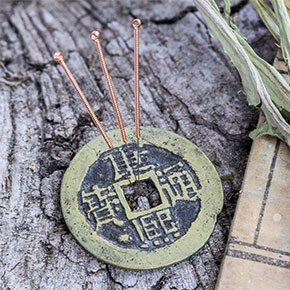Acupuncture Degree and Career Guide
You May Also Enjoy
Getting Licensed and Certified to Practice Acupuncture
This master’s-level healing profession requires credentials in order to practice, but requirements aren’t the same everywhere.

Acupuncturists are currently required to have some sort of licensure in 47 states and in the District of Columbia. However, licensure requirements are not the same in all states. In some, you’ll need to take a series of exams. In others, you’ll need to maintain a national certification along with your state license. In still others, you’ll only need to submit proof of your education to your state board.
In This Article
No matter your state’s rules, getting licensed is incredibly important. It can allow you to practice and to work in certain facilities. You’ll also need a license to accept insurance payments at your own clinic. In fact, even if you live in a state where licensure isn’t required, earning a national certification can be a big career boost, because it will show your knowledge and professional dedication to clients.
However, your first priority should be making sure you’re all set to practice in your state. Here’s what you need to know, whom you need to contact, what tests you’ll need to take, and more.
State Licensing and Certification Requirements
Licensure rules can vary from state to state, but there are a few things you’ll find just about everywhere. First of all, you’ll need an education. Acupuncturists need at least a master’s degree to practice. While this isn’t spelled out by states that don’t require licensure, it’s still best practice.
Beyond your degree, you’ll normally need to take exams to prove your knowledge. As a rule, you’ll need to take exams from the National Certification Commission for Acupuncture and Oriental Medicine (NCCAOM), although there are exceptions. You don’t need to take NCCAOM exams in:
Alabama
The state doesn’t license acupuncturists, however, medical doctors, osteopaths, chiropractors, and physician assistants can perform acupuncture in the state of Alabama with no additional training required. There is a push for change and efforts might result in Alabama requiring acupuncture licensure in the near future.
California
Has its own acupuncture licensing exam
Maryland
Requires licensure, but not NCCAOM exams
North Dakota
Requires licensure, but not NCCAOM exams
Oklahoma
The state does not have a licensing certification for acupuncturists. Currently, Oklahoma considers acupuncture to be within a medical doctor’s scope of practice. Chiropractors are also permitted to practice acupuncture. This might change in the future as professional organizations continue to advocate for licensure.
South Dakota
The state does not offer acupuncture licensure, although medical doctors, osteopaths, and chiropractors are able to practice acupuncture with additional training, testing, or certification. As with Alabama and Oklahoma, this might change down the road.
The exams you’ll need to take will depend on your state. NCCAOM offers four:
Acupuncture with Point Location
Foundations of Oriental Medicine
Biomedicine
Chinese Herbology
To earn licensure in all states that require NCCAOM certification, you’ll need to take the following exams:
These are the standard exams required for licensure and certification. However, some states also require that you take the Chinese Herbology exam, especially if you want to practice herbs.
Even if your state doesn’t require you to earn NCCAOM certification, you’ll need to take NCCAOM exams in all states but the ones listed above. This often includes at least the Acupuncture and Biomedicine exams. Requirements for the Oriental Medicine or Chinese Herbology exam vary by state.
You’ll need to take any required exams before you can earn licensure and practice acupuncture. In order to take an NCCAOM exam, you’ll need to have graduated from a school that’s been accredited by the Accreditation Commission for Acupuncture and Herbal Medicine (ACAOM). You’ll need to submit proof of your education, along with proof you’ve completed a course in Submit Clean Needle Technique (CNT) to NCCAOM. Once the board approves your application, you’ll be able to take the exams your state requires.
Once you pass your exams, you can submit your results to your state board. You’ll then be eligible for licensure. In some states, you’ll have to renew your license every few years. Depending on your state, this could mean proof you’ve kept your NCCAOM certification current, or you might need complete state-approved continuing education hours.
Beyond Certification:
More Ways to Up Your Acupuncture Game
In most states, you’ll be ready to practice once you earn certification and licensure, but that doesn’t mean you have to stop there. Acupuncturists can take a few routes to boost their career and widen their scope of practice. They include:
What Can I Earn?

Acupuncture salaries depend on several factors. Just like many professions, your education, credentials, experience, and place of work matter.
In acupuncture, there’s another element. Many acupuncturists run their own clinics. So instead of a consistent salary, their earnings depend on the clients they bring in and the business expenses they incur.
That’s why many acupuncture programs include some coursework in business management. If that doesn’t sound appealing to you, don’t worry. Many acupuncturists also find work in settings like medical centers or the offices of other providers.
Licensing and Certification Requirements by State
Since where you live can make a big impact on the steps you need to take to get your license, we’ve broken it down for you. Check out our state-by-state guide.
Alabama
An acupuncture license isn’t offered in Alabama, although licensed medical doctors, osteopaths, chiropractors, and physician assistants can offer it.
Alaska
Division of Corporations, Business and Professional Licensing
Training: A master’s degree from an ACAOM-accredited school
Exam: NCCAOM certification exams
Continuing Education Requirements: 15 hours every two years
Certification Requirements: Must maintain NCCAOM certification
Arizona
Arizona Board of Acupuncture Examiners
Training: A master’s degree from an ACAOM-accredited school
Exam: NCCAOM certification exams
Continuing Education Requirements: 15 hours every two years
Certification Requirements: Must maintain NCCAOM certification
Arkansas
Arkansas State Board of Acupuncture & Related Techniques
Training: A master’s degree from an ACAOM-accredited school
Exam: NCCAOM certification exams
Continuing Education Requirements: 24 hours every two years
Certification Requirements: Must maintain NCCAOM certification
California
Department of Consumer Affairs Acupuncture Board
Training: A master’s degree or approved training program from a California Acupuncture Board-approved school
Exam: The California Acupuncture Licensing Examination
Continuing Education Requirements: 50 hours every two years
Certification Requirements: None
Colorado
Colorado Office of Acupuncture Licensure
Training: A master’s degree from an ACAOM-accredited school
Exam: NCCAOM certification exams
Continuing Education Requirements: None
Certification Requirements: Must maintain NCCAOM certification
Connecticut
Department of Public Health, Acupuncturist Licensure
Training: A master’s degree from an ACAOM-accredited school
Exam: NCCAOM certification exams
Continuing Education Requirements: None
Certification Requirements: Must maintain NCCAOM certification
Delaware
Training: NCCAOM certification exams; Chinese Herbology exam required to practice herbs
Exam: NCCAOM certification exams
Continuing Education Requirements: 15 hours every two years
Certification Requirements: Must maintain NCCAOM certification
District of Columbia
Training: A master’s degree from an ACAOM-accredited school. Degree must include Chinese Herbology or Oriental Medicine training.
Exam: NCCAOM certification exams
Continuing Education Requirements: None
Certification Requirements: Must maintain NCCAOM certification. Must maintain Chinese Herbology or Oriental Medicine to practice herbs.
Florida
Training: A master’s degree from an ACAOM-accredited school
Exam: All NCCAOM exams, including Chinese Herbology or Oriental Medicine
Continuing Education Requirements: 30 hours every two years
Certification Requirements: None
More: Our guide to becoming an acupuncturist in Florida
Georgia
Georgia Composite Medical Board
Training: A master’s degree from an ACAOM-accredited school
Exam: NCCAOM certification exams
Continuing Education Requirements: None
Certification Requirements: Must maintain NCCAOM certification
Hawaii
Training: A master’s degree from an ACAOM-accredited school
Exam: NCCAOM exam in acupuncture and Oriental Medicine
Continuing Education Requirements: None
Certification Requirements: None
Idaho
Training: A master’s degree from an ACAOM-accredited school
Exam: NCCAOM certification exams
Continuing Education Requirements: 15 hours every two years
Certification Requirements: Must maintain NCCAOM certification
Illinois
Illinois Department of Financial and Professional Regulation
Training: A master’s degree from an ACAOM-accredited school
Exam: All NCCAOM exams except Chinese Herbology
Continuing Education Requirements: None
Certification Requirements: None
Indiana
Indiana Professional Licensing Agency
Training: A master’s degree from an ACAOM-accredited school
Exam: NCCAOM certification exams
Continuing Education Requirements: 60 hours every four years
Certification Requirements: Must maintain NCCAOM certification
Iowa
Training: A master’s degree from an ACAOM-accredited school
Exam: NCCAOM certification exams
Continuing Education Requirements: 30 hours every two years
Certification Requirements: Must maintain NCCAOM certification
Kansas
Kansas State Board of Healing Arts
Training: A master’s degree from an ACAOM-accredited school
Exam: All NCCAOM exams including Oriental Medicine and Chinese Herbology
Continuing Education Requirements: None
Certification Requirements: None
Kentucky
Kentucky Board of Medical Licensure
Training: A master’s degree from an ACAOM-accredited school
Exam: All NCCAOM exams except Chinese Herbology
Continuing Education Requirements: 60 hours every four years
Certification Requirements: None
Louisiana
Louisiana State Board of Medical Examiners
Training: A master’s degree from an ACAOM-accredited school
Exam: NCCAOM certification exams
Continuing Education Requirements: 15 hours every two years
Certification Requirements: Must maintain NCCAOM certification
Maine
Board of Complementary Health Care Providers
Training: A master’s degree from an ACAOM-accredited school
Exam: NCCAOM certification exams
Continuing Education Requirements: 15 hours every two years
Certification Requirements: Must maintain NCCAOM certification
Maryland
Training: A master’s degree from an ACAOM-accredited school
Exam: Not required
Continuing Education Requirements: None
Certification Requirements: None
Massachusetts
Board of Registration in Medicine
Training: A master’s degree from an ACAOM-accredited school. Degree should include Chinese Herbology or Oriental Medicine.
Exam: NCCAOM certification exams. Chinese Herbology exam required to practice herbs.
Continuing Education Requirements: 15 hours every two years
Certification Requirements: Must maintain NCCAOM certification. Must maintain Chinese Herbology or Oriental Medicine certification to practice herbs.
Michigan
Training: A master’s degree from an ACAOM-accredited school
Exam: NCCAOM certification exams
Continuing Education Requirements: 15 hours every two years
Certification Requirements: Must maintain NCCAOM certification
Minnesota
Minnesota Board of Medical Practice
Training: A master’s degree from an ACAOM-accredited school
Exam: NCCAOM certification exams
Continuing Education Requirements: 60 hours every four years
Certification Requirements: Must maintain NCCAOM certification
Mississippi
Mississippi State Board of Medical Licensure
Training: A master’s degree from am ACAOM-accredited school
Exam: NCCAOM certification exams
Continuing Education Requirements: 15 hours every two years
Certification Requirements: Must maintain NCCAOM certification
Missouri
Missouri Division of Professional Registration
Training: A master’s degree from am ACAOM-accredited school
Exam: NCCAOM certification exams
Continuing Education Requirements: 60 hours every four years
Certification Requirements: Must maintain NCCAOM certification
Montana
Montana Board of Medical Examiners
Training: A master’s degree from am ACAOM-accredited school
Exam: NCCAOM Oriental Medicine and Acupuncture exams
Continuing Education Requirements: None
Certification Requirements: None
Nebraska
Nebraska Department of Health and Human Services
Training: A master’s degree from am ACAOM-accredited school
Exam: NCCAOM Oriental Medicine and Acupuncture exams
Continuing Education Requirements: 50 hours every two years or 60 hours every four years to maintain NCCAOM certification if you have one
Certification Requirements: None
Nevada
Nevada State Board of Oriental Medicine
Training: A master’s degree from am ACAOM-accredited school
Exam: NCCAOM certification exams. Chinese Herbology exam required to practice herbs
Continuing Education Requirements: 15 hours every two years
Certification Requirements: Must maintain NCCAOM certification
New Hampshire
Board of Acupuncture Licensing
Training: A master’s degree from am ACAOM-accredited school
Exam: NCCAOM certification exams
Continuing Education Requirements: 60 hours every four years
Certification Requirements: Must maintain NCCAOM certification
New Jersey
Training: A master’s degree from an ACAOM-accredited school. Must include Chinese Herbology or Oriental Medicine.
Exam: All NCCAOM exams including Oriental Medicine and Chinese Herbology
Continuing Education Requirements: None
Certification Requirements: None for acupuncture but must maintain Chinese Herbology or Oriental Medicine certificate to practice herbs.
New Mexico
New Mexico Regulation & Licensing Department, Board of Acupuncture and Oriental Medicine
Training: A master’s degree from an ACAOM-accredited school
Exam: All NCCAOM exams including Oriental Medicine and Chinese Herbology
Continuing Education Requirements: None
Certification Requirements: None
New York
NY State Education Department Office of the Professions
Training: A master’s degree from an ACAOM-accredited school
Exam: NCCAOM Acupuncture and Oriental Medicine exams
Continuing Education Requirements: None
Certification Requirements: None
North Carolina
North Carolina Acupuncture Licensing Board
Training: A master’s degree from an ACAOM-accredited school
Exam: All NCCAOM exams except Chinese Herbology
Continuing Education Requirements: None
Certification Requirements: None
North Dakota
North Dakota Board of Integrative Health Care
Training: A master’s degree from an ACAOM-accredited school
Exam: Not required
Continuing Education Requirements: None
Certification Requirements: None
Ohio
Training: A master’s degree from an ACAOM-accredited school. Degree must include Chinese Herbology or Oriental Medicine.
Exam: NCCAOM certification exams
Continuing Education Requirements: 60 hours every four years
Certification Requirements: Must maintain NCCAOM certification. Must maintain Chinese Herbology or Oriental Medicine certification to practice herbs.
Oklahoma
The state does not have a licensing certification for acupuncturists, although a licensed chiropractor or medical doctor can practice.
Oregon
Training: A master’s degree from an ACAOM-accredited school
Exam: NCCAOM certification exams
Continuing Education Requirements: None
Certification Requirements: Must maintain NCCAOM certification
Pennsylvania
Training: A master’s degree from an ACAOM-accredited school
Exam: NCCAOM Acupuncture and Oriental Medicine exams. Must pass Chinese Herbology exam to practice herbs.
Continuing Education Requirements: None
Certification Requirements: None
Rhode Island
Rhode Island Department of Health
Training: A master’s degree from an ACAOM-accredited school
Exam: All NCCAOM exams except Chinese Herbology
Continuing Education Requirements: None
Certification Requirements: None
South Carolina
South Carolina Board of Medical Examiners
Training: A master’s degree from an ACAOM-accredited school
Exam: NCCAOM certification exams
Continuing Education Requirements: 60 hours every four years
Certification Requirements: Must maintain NCCAOM certification
South Dakota
The state does not offer acupuncture licensure, although it does consider acupuncture to fall within the range of treatments it allows from licensed chiropractors, medical doctors, and osteopaths.
Tennessee
Tennessee Department of Health
Training: A master’s degree from an ACAOM-accredited school
Exam: NCCAOM certification exams
Continuing Education Requirements: 60 hours every four years
Certification Requirements: Must maintain NCCAOM certification
Texas
Texas State Board of Acupuncture Examiners
Training: A master’s degree from an ACAOM-accredited school
Exam: All NCCAOM exams including Oriental Medicine and Chinese Herbology
Continuing Education Requirements: None
Certification Requirements: None
Utah
Division of Occupational and Professional Licensing
Training: A master’s degree from an ACAOM-accredited school
Exam: NCCAOM certification exams
Continuing Education Requirements: None
Certification Requirements: Must maintain NCCAOM certification
Vermont
Office of Professional Regulation
Training: A master’s degree from an ACAOM-accredited school
Exam: NCCAOM Acupuncture and Oriental Medicine exams. Must pass Chinese Herbology exam to practice herbs.
Continuing Education Requirements: None
Certification Requirements: None
Virginia
Virginia Office of Professional Regulation
Training: A master’s degree from an ACAOM-accredited school
Exam: NCCAOM certification exams
Continuing Education Requirements: 60 hours every four years
Certification Requirements: Must maintain NCCAOM certification
Washington
Washington State Department of Health
Training: A master’s degree from an ACAOM-accredited school
Exam: All NCCAOM exams except Chinese Herbology
Continuing Education Requirements: None
Certification Requirements: None
West Virginia
West Virginia Board of Acupuncture
Training: A master’s degree from an ACAOM-accredited school
Exam: NCCAOM Acupuncture and Oriental Medicine exams
Continuing Education Requirements: None
Certification Requirements: None
Wisconsin
State of Wisconsin Department of Safety and Professional Services
Training: A master’s degree from an ACAOM-accredited school
Exam: NCCAOM Acupuncture and Oriental Medicine exams
Continuing Education Requirements: None
Certification Requirements: None
Wyoming
Training: A master’s degree from an ACAOM-accredited school
Exam: All NCCAOM exams except Chinese Herbology
Continuing Education Requirements: None
Certification Requirements: None
Certificate vs Certification
Certificate:
A certificate is awarded by an educational institution, and signifies that a student has satisfactorily completed a given curriculum. Certificate programs can help students prepare for certification exams.
Certification:
A certification is generally awarded by a trade group after an individual has met certain professional requirements (e.g. earned a specific degree, worked professionally in a given field for a set amount of time, etc.) and passed a certification exam.
In short, a certificate is evidence that someone has completed an educational program, while a certification denotes that someone has met a certain set of professional criteria and/or passed an exam.
Not all programs offered are designed to meet state educator licensing or advancement requirements; however, it may assist candidates in gaining these approvals in their state of residence depending on those requirements. Contact the state board of education in the applicable state(s) for requirements.

Written and Reported by:
Stephanie Srakocic
Contributing Writer
